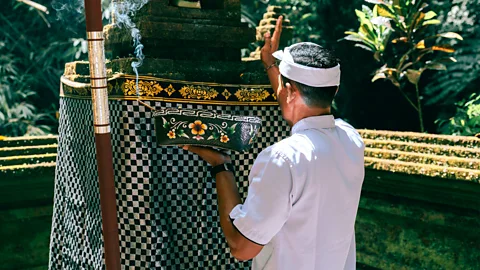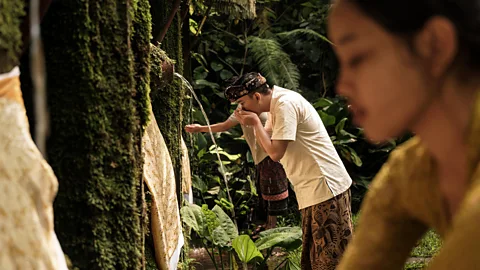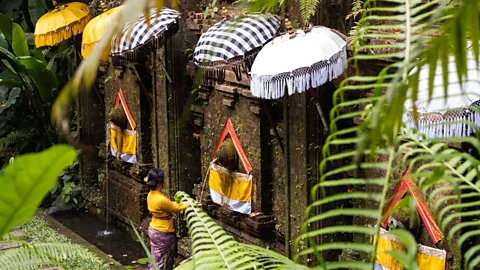'Like a form of therapy': An ancient water wellness practice to cleanse mind, body and soul
 Getty Images
Getty ImagesA purification ceremony in Bali is trending on TikTok. While some locals welcome the interest, others are concerned that their religion is becoming a wellness trend.
The 11th-Century Mengening Temple lies nestled at the bottom of the Pakerisan River valley near Ubud, Bali. Carpeted with moss, the Unesco Heritage site appears to blend into the natural surrounds. The only sound that can be heard within the grounds is the rushing of spring water as it spills out of the temple's ancient waterspouts into the deep pools below.
Very little has appeared to have changed here for centuries.
Except now, winding their way through the holy water pools are lines of sarong-clad Westerners who take it in turns to dutifully place their heads underneath the spouts of ice-cold holy water in an attempt to cleanse their mind, body and soul.
Balinese Hindus believe the Malukat ceremony (also spelt melukat), which involves prayers, a blessing by a priest and being doused with holy water, helps you find inner peace. And since the end of the pandemic, increasing numbers of Westerners have been flying to the tropical island of Bali to take part in this ancient purification ceremony.
Well World
BBC Travel's Well World is a global take on wellness that explores different ways that cultures the world over strive for a healthy lifestyle.
TikTokers are helping to drive the interest in the Malukat ceremony with videos of travellers being bathed in ancient temples or under sacred waterfalls. The uptick has seen luxury hotels attempting to make the ceremony even more memorable for their guests by offering VIP entry to sacred fountains and organising for village priests to welcome wellness seekers into their homes. The Intercontinental Bali Jimbaran reported a 15-times increase in guests requesting a Malukat ceremony since the pandemic, and the newly opened Anantara Ubud includes a spiritual purification ceremony with a high priest in its wellness menu.
There are various Malukat ceremonies and each one has a distinct purpose. It can help rid a person of misfortune, diminish illness, request prosperity in business and prepare newlyweds for marriage.
 Georg Roske
Georg Roske"Malukat originates from the Sanskrit word 'lukat', which means to be 'free from suffering'," says Marlowe Bandem, curator of the Saka Museum in Bali, which pays homage to Balinese culture. He explains that the cleansing ritual is held on auspicious days such as the full Moon, new Moon or an individual's Balinese birthday, which is based on the Balinese calendar and falls every 210 days.
How to participate responsibly
To take part in a Malukat, Marlowe Bandem suggests you visit a temple and speak with a pemangku (temple priest).
The ceremony can be held at a family shrine, a temple, in a river or in the ocean in the presence of a priest. The holy water represents the essence of life. "Accompanying these acts are offerings, mantras, the gentle chiming of a bell and incense smoke, all of which deliver prayers to the heavens," says Bandem. "Sincere intent and a pure heart remain the key to fulfilling these sacrificial rites."
Amanda Rollins, an American content creator who lives in Paris, decided to book a purification ceremony at Tri Desna in Ubud after seeing a video on TikTok. "It looked really intense. I could tell it was going to be a once in a lifetime type of thing and so that's actually what spurred me to [go] on the trip," she says. Rollins paid IDR 1,950,000 (£97) for the 90-minute purification ceremony.
"I think of mental health and spirituality the same way as gym or brushing your teeth," says Rollins. "You gotta work it out."
Rollins, who is known as americanfille to her 1.3 million followers, travelled to what she describes as a homestay surrounded by jungle. During the ceremony, Rollins was given a reading by healer, then blessed with water in front of a garden shrine. As the healer's female assistant said a chant, the healer used a ladle to pour holy water over Rollins' head. Rollins was encouraged to shout to free herself of bad energy.
The TikToker described the experience as "raw" and "primal", but at the same time she said she felt lighter. "I'm not a particularly religious person, but I do feel like that was like a form of therapy," she said.
 Georg Roske
Georg RoskeAndrea Elliott from Houston, Texas, had a similar experience. Having being made redundant after working in the oil and gas industry for 15 years, she had what she called her "Eat, Pray, Love moment" and booked a holiday to Bali for some R&R on the beaches. Elliott googled local activities and came across a consultation with a priest including a purification ceremony at a 1,000-year-old temple. She was intrigued. "I think I was uncertain about where I was going in life and just wanted direction," she says.
More like this:
• The US state where 'America drinks its way to health'
• The new travel retreats addressing depression and grief
• Labyrinth walking: An ancient activity that could help ease anxiety
Elliott was taken with six other visitors to the Mengening Temple, which is filled with sacred springs. She descended its stone steps in an ochre-coloured sarong to walk waist deep in water through the pools. Elliott found herself filled with emotion. "I started crying. I just felt liberated," she says.
UK-based clinical psychologist Dr Marianne Trent says for Westerners these rituals provide a structure for emotional release that may be absent in their own cultures. "[The ceremony] can symbolise drawing a helpful line in the sand between past and present versions of ourselves, which is particularly valuable when moving forward from challenging times," says Trent.
As it is a religious ceremony, Elliott was concerned about cultural appropriation. "I wanted to be respectful as possible," she says. "I wanted to be guided and welcomed by a local [rather than] 'Ugh, what are you doing here">window._taboola = window._taboola || []; _taboola.push({ mode: 'alternating-thumbnails-a', container: 'taboola-below-article', placement: 'Below Article', target_type: 'mix' });
